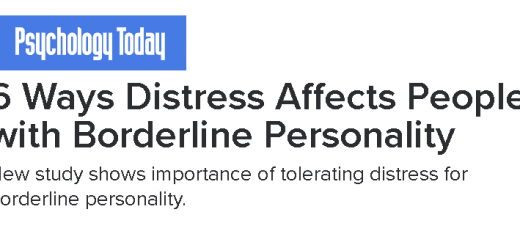Let’s Talk about Stigma
Mental health is an integral aspect of overall well-being, but unfortunately, it continues to be surrounded by stigma, discrimination, and misunderstanding. This is particularly true when it comes to borderline personality disorder.
Despite significant progress in recognizing mental health issues as legitimate health concerns, the pervasive stigma around mental health in general – and BPD in particular – persists, preventing many individuals from seeking help and receiving the support they need.
Let’s look at the essence of the stigma surrounding mental health, delving into its roots, consequences, and possible approaches to dismantle it.
The Origins of Mental Health Stigma
Understanding mental health stigma requires an examination of its roots. Stigma emerges from deeply ingrained societal beliefs, cultural norms, and historical perceptions that portray mental illnesses as signs of weakness or moral failings.
Historically, mental health disorders were often associated with supernatural forces, leading to the stigmatization and alienation of those affected. Over time, these misconceptions have evolved but continue to manifest in various forms, perpetuating harmful stereotypes.
Stigma also comes from a lack of understanding, about complex conditions like BPD but also mental health in general.
Media and Stigma
The media plays a crucial role in shaping attitudes towards mental health. Portrayals of mental illness in movies, television shows, and other forms of entertainment often perpetuate inaccurate and stigmatizing stereotypes.
Characters with mental health conditions are frequently depicted as dangerous, unstable or unpredictable, or even comedic, reinforcing stigmatising and negative perceptions. Media representation, when skewed or sensationalized, contributes significantly to the perpetuation of stigma.
Impact of Stigma
The consequences of stigma in mental health are profound and extend beyond simple societal perceptions. Individuals facing mental health challenges often internalize the stigma they face, leading to feelings of shame, guilt, and isolation.
Fear of judgment and discrimination prevents many from seeking help, exacerbating their conditions and hindering recovery.
Stigma can also affect interpersonal relationships, as those with mental health conditions like BPD may be reluctant to disclose their struggles to friends, family, or employers, further isolating them from support networks.
Stigma in the Workplace
The workplace is a huge part of our lives, and when mental health stigma manifests, it affects both employees and employers. Many people fear the potential repercussions of disclosing their mental health conditions at work, such as discrimination, bias, professional setbacks or even dismissal.
This fear often leads to concealment, hindering open communication and preventing employees from accessing the support they need.
In turn, employers may lack awareness or understanding of mental health issues, perpetuating a cycle of stigma within the workplace.
Cultural Perspectives
Cultural factors significantly influence perceptions of mental health. Some cultures stigmatize mental illnesses more severely than others, viewing them as a source of shame or embarrassment.
Cultural norms surrounding stoicism and resilience may discourage individuals from expressing vulnerability or seeking help. It is essential to recognize and respect diverse cultural perspectives while promoting an inclusive and empathetic approach to mental health.
Combatting Mental Health Stigma with Education and Awareness
Education and awareness are vital tools in reducing mental health stigma. Initiatives and campaigns that provide accurate information about mental health conditions, their prevalence, and effective treatments can help to challenge misconceptions.
Educational programs should focus on dispelling myths, fostering empathy, and encouraging honest and open conversations. By normalizing discussions around mental health, society can break down the barriers that contribute to stigma.
Media Literacy and Responsible Representation
Media organizations play a crucial role in shaping public views on mental health, making it essential for them to adopt responsible practices in portraying mental health in the media.
Encouraging accurate depictions of mental illnesses in media can contribute to reducing stigma.
Collaborations between mental health advocates and media professionals can help ensure that portrayals are realistic, sensitive, and respectful of the diverse experiences of individuals with mental health conditions, and with borderline personality disorder in particular.
Promoting a Healthy Workplace Culture
Creating a mentally healthy workplace involves fostering a culture of support and understanding, encouraging conversations and changing the way they talk about mental health and BPD.
Employers can implement mental health policies, provide helpful resources for employees, and promote open conversations.
Training programs that educate employees and managers on mental health issues, reduce stigma, and teach effective communication skills can contribute to a more inclusive and supportive work environment.
By prioritizing employee well-being, organizations can break the stigma associated with mental health in the professional arena.
Championing Peer Support Networks
Peer support networks are instrumental in combating mental health stigma at the grassroots level. Individuals with lived experiences are experts by experience, and can share their stories, provide encouragement, and serve as role models for others facing similar challenges.
Peer support groups create a sense of community, reducing isolation and normalizing conversations about mental health and BPD. By showing live examples of resilience and recovery, these networks contribute to changing societal perceptions and fostering a more compassionate society, one group at a time.
Legislation and Advocacy
Legislation plays a crucial role in protecting the rights of individuals with mental health conditions and challenging discriminatory practices.
Advocacy efforts focused on eliminating the stigma surrounding mental health have the potential to bring about policy reforms, guaranteeing fair and impartial treatment for individuals across different domains of life, such as healthcare, education, and employment.
Efforts aimed at upholding anti-discrimination laws and advocating for mental health parity play a significant role in fostering a fairer and more empathetic society.
We can break the stigma of mental health
Mental health stigma remains a significant barrier to the well-being of individuals and society as a whole.
Understanding its origins, acknowledging its pervasive impact, and actively working towards dismantling it are essential steps in fostering a more compassionate and inclusive world.
By embracing education, responsible media representation, workplace culture transformation, peer support, and legislative advocacy, society can collectively break the chains of mental health stigma and pave the way for a future where individuals can seek help without fear, judgment, or discrimination.



